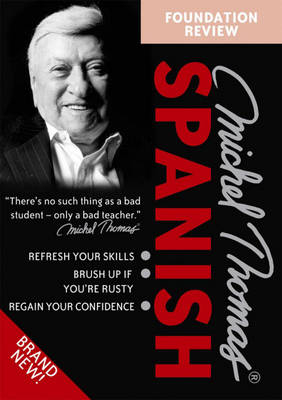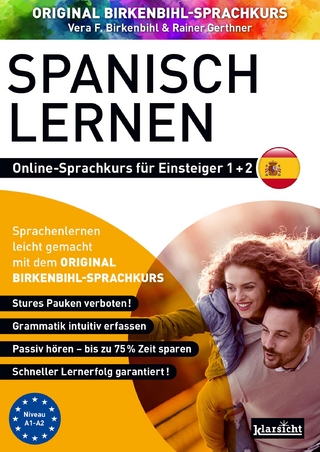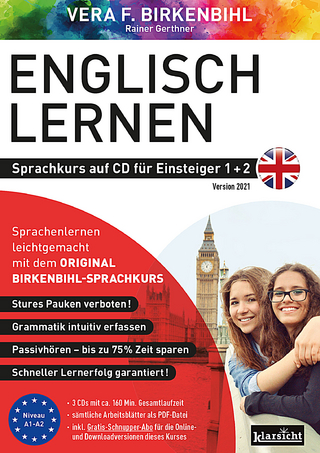
Michel Thomas Foundation Review Course
John Murray Learning (Verlag)
978-0-340-93896-6 (ISBN)
- Titel ist leider vergriffen;
keine Neuauflage - Artikel merken
Michel Thomas materials have been phenomenally successful since they were first published some six years ago. The brand new Review courses are a major new offering. For the first time, the student can quickly and easily review the entire teaching contents of the main course, to establish which areas need to be revisited or to consolidate learning. The Reviews can be used in many ways: when the student reaches the end of the main course to check or consolidate learning; as a quick refresher when the student returns to the main course after a lapse of time; for the newcomer to Michel Thomas looking for an overview of what the main courses contain. All the main teaching points have been lifted from the corresponding Foundation (8-hour) course and are contained on just 2 CDs. The student at home hears Michel teaching a specific point, there is a pause which allows time for the student to give his/her response to Michel's prompt, followed by Michel giving the correct response. If the student has struggled or given an incorrect answer, s/he can use the index in the accompanying booklet to locate the area of the main course where the specific language point was being taught in depth, and can return to the main course to work through the relevant section again, quickly and efficiently. Only Michel's words and phrases are on the new CDs, so the course is summarised succinctly and with a new, snappy pace.
Michel Thomas had an amazing life. Born in Poland, he spent his early years in Germany and then in France, where he studied psychology at the Sorbonne in Paris. When war broke out, he fought with the Resistance and suffered imprisonment in slave labour camps. At the end of the war he joined the US liberation army and later settled in the US where he established his world-famous language school. For more than 50 years he taught languages to the rich and famous and became the world's most sought-after language teacher.
Similarities with English; -ible, -able endings the same; 'es posible' (it is possible); 'para mi' (for me); 'no es posible para mi' (it is not possible for me); 'para usted' (for you); 'por que?' (why?); 'asi' (that way); 'lo siento' (it I feel = I feel it = I'm sorry); -o at end of verb espresses 'I'; 'yo' (I) used for emphasis only; pero' (but); -ante, -ente endings in Spanish = -ant, -ent endings in English; 'muy, bueno' (very, good); 'tengo, quiero' (I have, I want); 'tiene' (you have); 'que?' (what?); 'porque' (because); 'saber' (to know); 'puedo, puede' (I can, you can); 'hacer, comer' (to do, to eat); 'algo' (something); 'tengo hambre' (I have hunger = I am hungry); -ario ending in Spanish = -ary ending in English; 'y' (and); 'ver, verlo' (to see, to see it); -ancia, -encia endings in Spanish = -ance, -ence endings in English; 'la, una' (the, a); 'esta noche' (tonight); 'donde?'. (where?); 'cena, cenar' (dinner, to dine); -cion ending in Spanish = -tion ending in English; 'de' (of); 'que tipo?' (what type?); 'por favor' (please); 'hoy' (today); 'dar' (to give); verbs from English -ation nouns: transformation = transformacion = to transform = transformar; stress in Spanish words; infinitive in Spanish ends in -r; three types of verbs; 'verle, verlos, verme' (to see him, to see them, to see me); 'comprender, decir' (to understand, to say); 'tener, tener que' (to have, to have to); 'salir' (to leave); 'pronto' (soon); 'cuando' (when?); -ico ending in Spanish = -ical ending in English; 'cuanto?' ('how much'); 'estoy, esta, estar, esta' (I am, you are, to be, this); 'como?' (how?); 'voy, voy a' (I'm going, I'm going to); 'tarde, mas o menos' (late, more or less); 'no voy a hacerlo porque voy a estar muy ocupado hoy' (I'm not going to do it because I'm going to be very busy today); 'voy a Ilamarle mas tarde' (I'm going to call you later); 'a que hora?' (at what time?); 'va, va a' (you are going, you are going to): 'A que hora va a Ilamarme? (At what time are you going to call me?); 'el, ella' (he, she); 'estar, ser' (to be: temporarily, permanently): 'estoy/soy' (I am); 'se, no se' (I know, I don't know); revision of three verb groups; nouns, adjectives and verbs; 'venir' (to come); 'con, conmigo, con el, con ella' (with, with me, with him, with her); 'ir, voy, va' (to go, I'm going, you're going); 'comprar, encontrar' (to buy, to find); stress in present tense; 'vender, comprender, escribir' (to sell, to understand, to write); 'me gusta, me gusta escribir' (I like, I like to write); 'Sabe donde esta?' (Do you know where it is?); 'Por que no lo sabe?' (Why do you not know it?); present continuous tense in Spanish: 'que esta haciendo?' (what are you doing?); 'decir' (to say/tell); 'lo que' (that which = what): 'no comprendo lo que dice' (I don't understand what you are saying); 'quiere decir' (you want to say = you mean): 'no comprendo lo que quiere decir' (I don't understand what you mean; three verb types: endings for 'he/she/it/you'; 'quien?' (who?); 'nadie, todo el mundo' (no one, all the world = everyone); 'hablar' (to speak); 'lo hacen' (they do it/are doing it); 'tu' (you); giving orders (imperative): 'habla - hable!' (you speak - speak!); 'este, esta, ese, esa, esto, eso' (this, that): 'este/ese libro' (this/that book), 'esta/esa mesa' (this/that table), 'voy a comprar esto/eso' (I'm going to buy this/that); 'lo, la, los, las' (it, those): 'el lo/la compra; el los/las compra' (he is buying it; he is buying them); negative orders: 'no lo compre!' (don't buy it!); 'contigo' (with you); -mos ending for 'we': 'hablamos, comemos, salimos' (we speak, we eat, we leave); 'vamos, van, vas' (we are going, they are going, you are going); 'Ilegar' (to arrive); 'go-go' verbs: 'tengo, vengo, salgo' (I have, I come, I leave); 'go-go' verbs become 'ga-ga' in the imperative: 'venga conmigo!' (come with me!); 'Ilamar' (to call); 'e to ie' verbs: 'tener - tiene' (to have - you have); 'comenzar, empezar, pensar, entender, querer' (to begin, to begin, to think, to understand, to want); 'o to ue' verbs: 'poder - puedo' (to be able to - I am able to = can); 'encontrar, recordar, volver; (to find, to remember, to return); 'nos, se': 'nos levantamos, se levanta' (we get [ourselves] up, you get [yourself] up); 'hay' (there is/are); 'ver' (to see): 'vemos, no lo veo, le veo manana' (we see, I don't see it, I'll see you tomorrow); - re = future ending = 'I will': 'hablare, comere, comprare'(I will talk, I will eat, I will buy); -remos = future ending = 'we will': 'esperaremos' (we will wait); three ways to form future; -ra, -ran, -ras = future endings = you/he/she/it will, you/they will, you will; 'ser, sera' (to be, it will be); 'go-go' verbs add 'd' for future: tener - tengo - tendre; salir - salgo - saldre' (to have, I have, I will have; to leave, I leave, I will leave); 'decir - digo - dire' (to say/tell, I say/tell, I will say/tell); 'hacer - hago - hare' (to do/make, I do/make, I will do/make); -ria ending = would: 'sera necesario - seria necesario; lo hare - lo haria' (it will be necessary - it would be necessary; I will do it - I would do it); 'mandar' (to send); 'quisiera' (I would like); forming the past: -ar verbs - -ado; -er/-ir verbs - -ido; 'he, hemos, ha, han, has' (I have, we have, you/he/she/it has, you have - when forming past tense); 'he comprado algo; lo hemos comprado' (I have bought something; we have bought it); 'hacer - lo he hecho; decir - le he dicho' (to do/make - I have done/made it; to say/tell; I have said/told it); to say 'let's': 'esperemos!; no lo compremos!' (let's wait!; let's not buy it!); -ing present: 'estoy esperando; lo estoy haciendo' (I am waiting; I am doing/making it); -ing past: -aba for -ar verbs; -ia for -er/-ir verbs: 'esperaba, salia, lo hacia' (I was waiting, I was leaving, I was making/doing it); 'esta hecho, preparado, dicho, visto, puesto' (it is done/made, prepared, said, seen, placed); 'tengo ganas de' (I have the urge to = I want); 'para saber' (for to know = in order to know); 'acabo de salir' (I have just left); 'hace': 'hace diez minutos' (ten minutes ago).
| Erscheint lt. Verlag | 7.12.2006 |
|---|---|
| Reihe/Serie | Michel Thomas Series |
| Sprache | englisch |
| Maße | 136 x 189 mm |
| Gewicht | 180 g |
| Themenwelt | Schulbuch / Wörterbuch ► Wörterbuch / Fremdsprachen |
| Geisteswissenschaften ► Sprach- / Literaturwissenschaft ► Sprachwissenschaft | |
| ISBN-10 | 0-340-93896-X / 034093896X |
| ISBN-13 | 978-0-340-93896-6 / 9780340938966 |
| Zustand | Neuware |
| Haben Sie eine Frage zum Produkt? |
aus dem Bereich


